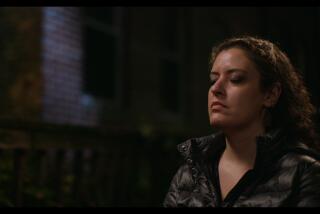Love Unknown<i> by A.N. Wilson (Viking: $16.95; 202 pp.) </i>
“Love Unknown” is droll. I haven’t used that word for a long time, if ever. It was put away in case something came along that required it. Storage dried out “droll” and turned it dusty, and now here comes the dried-out and faintly dusty wit of A. N. Wilson’s book.
“Once upon a time there were three nice young women who lived together at 73 B Oakmoor Road, London N.W. 2,” begins the prelude to his comedy of friendship, betrayal and passion as absurdity. Through this archway, we glimpse Richeldis, Belinda and Monica, who are engrossed mainly in men, and particularly in Richeldis’ Simon, the Man of Her Dreams.
Capitalized nouns lace the author’s purpose as he quickly brings us up to the present, when the story proper gets started. Monica has gone to Paris to lead a single life; Belinda has had numerous marriages and affairs, and Richeldis has dedicated herself to Simon and their four children, instead of “Using her Brain, Having a Career, Fulfilling Herself.”
Approaching middle-age, Richeldis lives in cowlike contentment, certain that all is for the best in the best of all possible suburbs--even if Simon is often curt and travels a lot. For their part, Belinda and Monica have made a mental icon out of their friend’s marriage. Richeldis is so much stabler than they, and she has managed to live happily ever after.
No icon without an iconoclast. The spectacle of Richeldis gives her former roommates moral itch. So it is with a most pleasurable horror that Monica--and Belinda who is visiting her in Paris2056096402an excursion to Fontainebleau.
Monica hauls Simon off for a righteously recriminatory lunch. Like the eating scene in the film “Tom Jones,” lunch turns mutually arousing. Wilson is very good at simple greed of all kinds.
Even more arousing to Monica, are Simon’s complaints that Richeldis is dull and doesn’t fulfill his deepest needs. Monica had been waiting for a quarter century to fulfill Simon’s deepest needs, and before long, she is doing it. Unfortunately, they turn out to be not so very deep.
As it had with Richeldis, and with the Fontainebleau companion and her squad of predecessors, Simon’s “longing melted into tenderness, tenderness to pity, pity very quickly changed to despising.” Unable to stand heat, the stove-lighter unfailingly exits the kitchen.
Wilson treats his characters as puppets, for the most part, though they are beautifully assembled. Here is his sketch of the compulsive Richeldis brightening up from her depression--an unsuspecting depression--over Simon’s continual snubs. Her mother, Madge, has given way to senile dementia in London, and Richeldis girds herself to cope.
“There was a crisis, and she was now ready to be ‘marvelous,’ ” Wilson writes of her blitzkrieg preparations for marshaling Mrs. Turbot, her housekeeper, and for getting her household organized so that she can drive into town to take charge.
“When she arrived at Rockingham Crescent, it was only 20 to 11. Not bad going, she considered. She had rung Simon--blither him; organized Mrs. Turbot, bless her; taken Marcus to his play group; done a last-minute shop to make sure there were provisions for his high tea, and roared up the motorway in her little Renault.”
Madge’s madness is a major comic number, though here, as elsewhere, Wilson’s comedy has a touch of nastiness to it. She is certain that messages are being sent up her radiator, that the postman is stuffing excrement into her mailbox, and that it is necessary to cover her eyes with damp tissues. She was once a successful publisher; now, this strong-minded intellectual has become a pitiable, senile clown.
Wilson’s nastiness has a purpose to it. He uses the comical deceits and hypocrisies of “Love Unknown” to create a deliberately unsound framework for its world; a contemporary, well-heeled, intellectually fashionable English World, an amalgam of Thatcherism and lefty-trendy.
Like Evelyn Waugh’s, Wilson’s comedy is cold indictment; like Waugh, there is an underlying religious suggestion to the indictment. And like Waugh, he uses a simple soul--in this case, a naive but faithful clergyman--as a non-judgmental instrument of the author’s harsh judgment.
Bartle is Simon’s brother, hopeless at the skills needed for contemporary living, and innocently shielded from its corruption.
“The crucially important fact in his life was that, until he was about 40, he had never cleaned his teeth properly,” Wilson writes. Bartle’s teeth rotted, he developed halitosis, and his wife, who would never judge someone by his breath, decided it was a matter of character and left him. It is a wickedly ingenious touch in Wilson’s portrait of a society where cleanliness, having sidled up next to godliness, has displaced it.
Bartle drinks out of grief, loses his vicar’s post and goes to live with Madge, who he takes care of. He has disappeared into his own dark night. But there is salvation for him, and it takes a decidedly old-fashioned form. Wilson brings down a thunderstorm, clearly divine, which manages to sort everyone out. It mystically restores Bartle’s active faith; it totally unhinges Madge; it begins the dissolution of Simon’s and Monica’s affair, and it manages to give Richeldis the self-confidence to end her submissiveness to her husband.
That is a lot for a thunderstorm to do, and though Wilson works hard and cleverly enough to make it almost plausible, he does not make it convincing. The labor shows.
Wilson, for all his wit and subtlety, lacks the intensity to get his religious sentiment and his secular comedy to bond properly. He does not command Waugh’s ruthlessness, which cut away every other ground until only a bleak faith remained; nor does he have Grahame Greene’s compulsion to identify himself so strongly with human need that when he comes to a need labeled religion he can be wise about that one too.
Wilson doesn’t really know what to do with his holy fool, and at the end, he simply assigns true love and happiness to him--with a dental technician--while he assigns everyone else their various mild purgatories. It is very much laid on. Faith rides upon Wilson’s acrid comedy with the awkwardness of a parson wearing a clown suit at a church bazaar.
More to Read
Sign up for our Book Club newsletter
Get the latest news, events and more from the Los Angeles Times Book Club, and help us get L.A. reading and talking.
You may occasionally receive promotional content from the Los Angeles Times.









